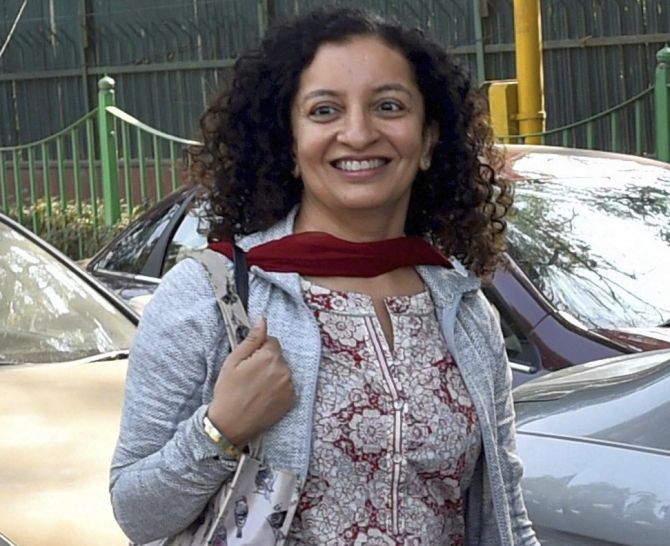Journalist Priya Ramani on Saturday sought acquittal in a criminal defamation complaint filed against her by former Union minister M J Akbar, saying freedom of speech and expression is intrinsic to a democratic society and her accusations of sexual harassment against him were her truth.
In the wake of the #MeToo campaign, Ramani in 2018 accused Akbar of sexual misconduct with her around 20 years ago, when he was a journalist.
Akbar resigned as a Union minister on October 17, 2018.
Ramani, who concluded her arguments on Saturday in the complaint filed against her by Akbar, told the court through her lawyer that the #MeToo campaign was started to correct the structural wrong, which was continuing for long.
“The #MeToo movement gave a platform to thousands of women all across the world to come forward and share their stories of sexual harassment. The #MeToo movement was started to correct the structural wrong.
“Freedom of speech and expression is critical and intrinsic to democracy. Ramani was a small part of a large movement. Hundreds and thousands of women participated in the #MeToo movement. I (Ramani) have proved my case and I deserve to be acquitted,” senior advocate Rebecca John, appearing for Ramani, told Additional Chief Metropolitan Magistrate Vishal Pahuja.
What Ramani had said against Akbar was ‘her truth, said in public good’, the lawyer said.
In response to the complainant’s argument as to ‘why did Ramani not raise her voice before’, John said there was a ‘culture of silence’ when the incident took place.
“She could not speak up as there was a culture of silence. Ghazala Wahab (a journalist and a witness in the case, who too have accused Akbar of sexual misconduct while she was working under him) pointed out that there was no mechanism for sexual harassment at the workplace.
“The Vishakha guidelines (to prevent sexual harassment at workplace) did not exist in 1993. Even after the guidelines came into place, the judiciary and the media took a long time to implement those,” she said.
John added that ‘silence cannot refute Ramani’s truth. She is not filing any FIR for the court to test the delay of the FIR on the ground of credibility’.
“Her silence has been adequately explained by her. There was a long delay in the implementation of the Vishakha guidelines, Ramani cannot be made to bear the brunt of it,” she said.
Ramani contested the reputation of Akbar through her own evidence, through that of Wahab and 14 other women, who accused him of sexual harassment at workplace in the wake of the #MeToo movement.
The court will again hear the matter on October 13.
Ramani had earlier told the court that she was ‘targeted selectively’ through a criminal defamation complaint by Akbar ‘to halt the avalanche of allegations of sexual misconduct that came out against him’ in the wake of the #MeToo movement in 2018.
Akbar had told the court that Ramani had defamed him by using adjectives such as ‘media’s biggest predator’ to describe him, which harmed his reputation.
The Bharatiya Janata Party leader has denied all the allegations of sexual harassment against him.
He had earlier told the court that the allegations levelled against him in an article in the Vogue magazine and the tweets that followed were defamatory on the face of it as the complainant had deposed those to be false and imaginary and that an ‘immediate damage’ was caused to him due to the ‘false’ allegations by Ramani.
Ramani had earlier told the court that her ‘disclosure’ of the alleged sexual harassment by Akbar had come at ‘a great personal cost’ and she had ‘nothing to gain’ from it.
She had said her move would empower women to speak up and make them understand their rights at the workplace.
Several women came up with accounts of alleged sexual harassment by Akbar while they were working as journalists under him.
The former Union minister has dismissed the allegations as ‘false, fabricated and deeply distressing’.




